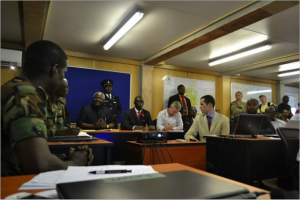Fighting Ebola with information
Last October, I went to Sierra Leone to work on Ebola. I helped set up a National Situation Room to compile data on the Ebola response, and use that data to drive decision-making. With its big projector screens and maps on the wall, it looked a bit like Mission Control. The Government of Sierra Leone was in charge, with support from the British military, the UN agencies and the Africa Governance Initiative (AGI), where I worked at the time.
We had a good idea of where the Ebola cases were: the Ministry of Health and WHO reported those. So when we set up the Situation Room, we asked districts to report how many beds, health workers and ambulances they had. The results were shocking. More than 90 per cent of patients were in the west of the country, within 100km of the capital Freetown. But around 50 per cent of the beds were in the east, 5-10 hours away by road. When someone gets Ebola, you need to isolate them quickly so they don’t infect anyone else. The disease started in the east, so it made sense to open beds there at first. But when the disease moved west, the beds and health workers didn’t follow.
Our initial response was to try to move patients to where the beds were. Soon the ambulances started to break down, and some patients died on the long journey. In the end, the government persuaded the British government, MSF and others to open more beds around Freetown. It took until late December, eight months after the first case of Ebola, to have enough beds for everyone.

Another job of the Situation Room was keeping track of payments to nurses, ambulance drivers and burial workers. Fighting Ebola is difficult and dangerous business: over a hundred health workers have lost their lives in Sierra Leone. They are entitled to a hazard allowance of $100 to $200 per week. But many of the people receiving the hazard allowance were not on government payroll and didn’t have bank accounts. The only reliable way to pay them was in cash, with the ensuing risk of theft and fraud. The government faced a true dilemma: delay payments and run the risk of strike action; or release the money in the knowledge that some of it will go missing.
One job we were unable to do in the Situation Room was to keep track of the aid coming into Sierra Leone. Many people and agencies felt compelled to help, but none felt compelled to share their data. Donor delegations flew in and out, but they didn’t always disburse the money they had committed. This made it even harder for the government to pay salaries on time. Donations in kind were no easier to track: we had to call multiple people in each district to work out how many ambulances they had, and when they broke down, it seemed nobody had budgeted for spare parts.
Ebola is now coming under control, but the damage has been immense. Thousands of Sierra Leoneans lost their lives, and the World Bank has forecast more than a billion dollars of economic losses across West Africa. It is critical that the affected countries and their international partners do a better job of the recovery than they did of the initial response. Last week, the European Commission invited the leaders of Liberia, Guinea and Sierra Leone to Brussels. Liberia’s President Ellen Johnson-Sirleaf called for a ‘Marshall Plan’ that was owned and led by those countries, but financed from abroad. That may seem obvious, but it will require donors to publish their plans, including financial commitments, and then stick to them.
Donors in Brussels were reluctant to pass money through country systems, fearing corruption. Indeed, the Government of Sierra Leone’s own audit report found that $5.7 million of the government’s own Ebola spending had not been properly accounted for. But that is no excuse for withholding information. Speaking at the Brussels conference, Sierra Leone’s President Ernest Bai Koroma argued that fighting corruption and aid transparency go hand in hand:
“Transparency and accountability will be critical to the success of these proposals. In Sierra Leone, in line with my pronouncements at the very commencement of our fight against the virus, our accountability watchdog agencies – the Audit Services, Parliament and the ACC have commenced actions on ensuring this. We ask donors to improve their transparency also by publishing what they fund according to the International Aid Transparency Initiative. This will make us more effective and allow donors and our citizens to hold us to account.”
When I left Sierra Leone, I joined Publish What You Fund to campaign for aid transparency. We are holding donors to their commitment to publishing their aid flows to a common, open standard, the International Aid Transparency Initiative. The deadline for publication is the end of 2015. We will report during the year on how they are doing.
Transparency is not just a lofty principle: it’s a practical way of saving money and saving lives. The Situation Room fights Ebola with information. Now we need to bring that same power to the recovery.

